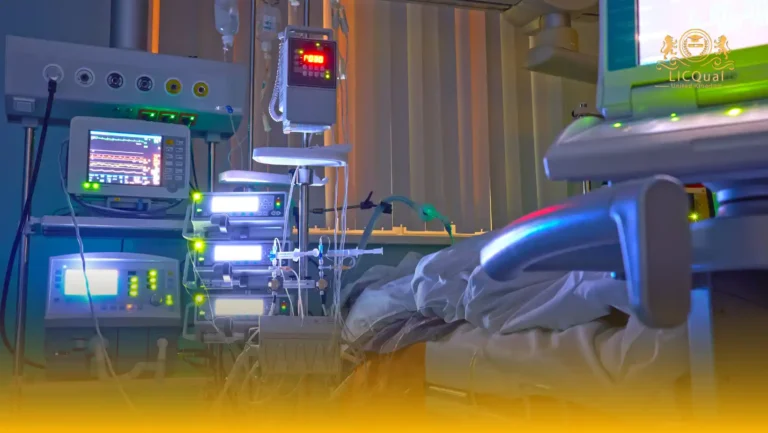The LICQual Level 3 Certificate in Clinical Pathology (Cert CP) is a specialised qualification designed for healthcare professionals seeking to enhance their expertise in clinical diagnostics, laboratory procedures, and patient care, while advancing their career prospects and strengthening their Continuing Professional Development (CPD). This course is not intended for fresh candidates; it is tailored for learners who already have experience in healthcare, laboratory science, or clinical support roles and wish to gain advanced knowledge in clinical pathology.
Learners on this course will explore a wide range of topics, including laboratory safety and ethics, specimen collection and handling, haematology, microbiology, clinical biochemistry, and diagnostic techniques. The course equips learners with the knowledge and skills required to perform accurate laboratory assessments, interpret test results, and support effective patient care.
The qualification emphasises both theoretical understanding and practical application. Learners will gain insights into laboratory protocols, quality control procedures, diagnostic testing, and professional standards, ensuring they are fully prepared to contribute safely and effectively in clinical pathology settings.
Centres delivering the LICQual Level 3 Certificate in Clinical Pathology must ensure teaching is conducted by competent and qualified staff, supported with appropriate learning materials and resources. Accredited centres must provide a structured learning environment that promotes learner engagement, practical competency, and successful achievement of the qualification.
Upon completion, learners will be equipped to apply evidence-based diagnostic techniques, enhance laboratory accuracy, support multidisciplinary teams, and improve patient outcomes, making a significant impact in the field of clinical pathology.
Course Overview
Qualification Title
LICQual Level 3 Certificate in Clinical Pathology (Cert CP)
Total Units
6
Total Credits
24
GLH
120
Qualification #
LICQ2200841
Qualification Specification
To enroll in the LICQual Level 3 Certificate in Clinical Pathology (Cert CP) , applicants must meet the following criteria:
|
Qualification# |
Unit Title |
Credits |
GLH |
|---|---|---|---|
|
LICQ2200841-1 |
Introduction to Clinical Pathology |
4 |
20 |
|
LICQ2200841-2 |
Hematology and Blood Analysis |
4 |
20 |
|
LICQ2200841-3 |
Clinical Biochemistry |
4 |
20 |
|
LICQ2200841-4 |
Microbiology and Infectious Disease Testing |
4 |
20 |
|
LICQ2200841-5 |
Immunology and Serology |
4 |
20 |
|
LICQ2200841-6 |
Laboratory Management and Professional Practice |
4 |
20 |
By the end of this course, learners will be able to:
Unit 1: Introduction to Clinical Pathology
Learning Outcomes:
- Understand the fundamental principles and scope of clinical pathology
- Identify the main branches of clinical pathology, including hematology, microbiology, biochemistry, and immunology
- Explain the role and responsibilities of a clinical pathologist in modern healthcare
- Demonstrate knowledge of laboratory safety protocols, ethical practices, and standard operating procedures
- Recognize and use basic laboratory equipment and techniques with accuracy
Unit 2: Hematology and Blood Analysis
Learning Outcomes:
- Explain the structure, function, and components of human blood
- Perform and interpret common hematology tests, including CBC, blood smears, and coagulation tests
- Understand blood group typing and the principles of blood transfusion
- Analyze hematology results accurately to support clinical decision-making
- Apply quality control measures and maintain precise laboratory records in hematology
Unit 3: Clinical Biochemistry
Learning Outcomes:
- Understand the biochemical composition and function of body fluids
- Conduct and interpret biochemical tests for enzymes, proteins, and electrolytes
- Assess liver, kidney, and metabolic function through laboratory investigations
- Apply safe handling procedures for biochemical samples and laboratory equipment
- Integrate biochemical test results into patient care planning
Unit 4: Microbiology and Infectious Disease Testing
Learning Outcomes:
- Identify bacteria, viruses, fungi, and parasites relevant to clinical pathology
- Apply culture, staining, and microscopic techniques to detect pathogens
- Perform pathogen identification and antibiotic susceptibility testing
- Implement laboratory safety protocols to prevent contamination and infection
- Interpret microbiology results accurately to inform clinical decisions
Unit 5: Immunology and Serology
Learning Outcomes:
- Understand the structure and function of the human immune system
- Perform serological tests such as ELISA, agglutination, and immunofluorescence
- Analyze antibody-antigen reactions and their clinical significance
- Ensure quality assurance in immunology laboratories
- Interpret immunology test results to support accurate diagnosis and treatment
Unit 6: Laboratory Management and Professional Practice
Learning Outcomes:
- Organize and manage laboratory workflow efficiently
- Apply health, safety, and regulatory compliance standards in laboratory operations
- Maintain accurate documentation, record keeping, and data confidentiality
- Demonstrate professional ethics and responsibilities in clinical pathology practice
- Engage in continuous professional development and stay updated on emerging pathology technologies
The LICQual Level 3 Certificate in Clinical Pathology (Cert CP) is designed for healthcare professionals, laboratory staff, and students who want to strengthen their knowledge of diagnostic science and laboratory practices. This Level 3 Clinical Pathology qualification is ideal for individuals seeking career advancement, CPD accreditation, or a pathway into specialized healthcare roles. Whether you are already working in a clinical setting or planning to enter the healthcare sector, this course provides the skills and recognition you need to stand out.
1. Healthcare Professionals Seeking Career Growth
- Nurses and allied health staff aiming to expand diagnostic knowledge
- Medical assistants looking to specialize in laboratory science
- Professionals seeking CPD-accredited qualifications
- Staff aiming for promotions in hospitals or diagnostic centers
- Clinicians who want to enhance patient care with pathology insights
2. Laboratory Technicians and Assistants
- Current lab staff seeking formal certification in clinical pathology
- Technicians aiming to improve specimen handling and safety skills
- Assistants preparing for supervisory or advanced roles
- Professionals needing structured training in haematology and microbiology
- Staff looking to align with international healthcare standards
3. Medical and Healthcare Students
- Students pursuing careers in medicine, nursing, or biomedical sciences
- Learners seeking a recognized Level 3 qualification to strengthen CVs
- Graduates preparing for postgraduate healthcare programs
- Students interested in laboratory diagnostics and clinical testing
- Individuals aiming to bridge academic knowledge with practical skills
4. Public Health and Community Healthcare Workers
- Professionals working in community health programs
- Staff involved in disease prevention and diagnostic outreach
- Workers supporting rural or underserved healthcare systems
- Individuals needing training in specimen collection and safety
- Public health officers seeking CPD-recognized qualifications
5. International Healthcare Professionals
- Overseas medical staff seeking UK-recognized qualifications
- Professionals aiming to meet global healthcare standards
- Migrant healthcare workers preparing for career opportunities abroad
- Staff needing formal certification for regulatory compliance
- Learners looking for flexible, accessible online training
6. Career Changers Entering Healthcare
- Professionals from science backgrounds transitioning into healthcare
- Individuals seeking a structured entry into clinical diagnostics
- Career changers aiming for stable, in-demand healthcare roles
- Learners motivated by long-term career security in medical fields
- Adults seeking accredited qualifications for professional credibility
7. Research and Academic Professionals
- Researchers needing applied knowledge in clinical pathology
- Academic staff supporting healthcare training programs
- Professionals contributing to diagnostic research projects
- Educators seeking CPD in laboratory science and diagnostics
- Scholars aiming to expand expertise in applied medical sciences
- Accredited Training Facilities: Centres must have a valid accreditation to deliver Level 3 clinical pathology courses according to international standards.
- Qualified Trainers: All instructors should hold relevant qualifications and professional experience in clinical pathology, medical laboratory science, or related healthcare fields.
- Laboratory Access: Centres must provide access to well-equipped laboratories, including hematology, biochemistry, microbiology, and immunology facilities for practical training.
- Health and Safety Compliance: Centres must comply with all local and international laboratory safety standards, including infection control, proper PPE usage, and emergency protocols.
- Learning Resources: Centres should provide up-to-date textbooks, digital learning materials, and access to clinical pathology databases for theoretical and practical learning.
- Assessment Facilities: Centres must have proper arrangements for conducting assessments, practical evaluations, and record-keeping in line with LICQual requirements.
- CPD Support: Centres should encourage and support learners’ continuous professional development through seminars, workshops, and access to research publications.
- Technical Support: Adequate IT infrastructure must be available to support online learning, digital assessments, and access to laboratory management software.
Assessment and Verification
All units within this qualification are subject to internal assessment by the approved centre and external verification by LICQual. The qualification follows a criterion-referenced assessment approach, ensuring that learners meet all specified learning outcomes.
To achieve a ‘Pass’ in any unit, learners must provide valid, sufficient, and authentic evidence demonstrating their attainment of all learning outcomes and compliance with the prescribed assessment criteria. The Assessor is responsible for evaluating the evidence and determining whether the learner has successfully met the required standards.
Assessors must maintain a clear and comprehensive audit trail, documenting the basis for their assessment decisions to ensure transparency, consistency, and compliance with quality assurance requirements.







